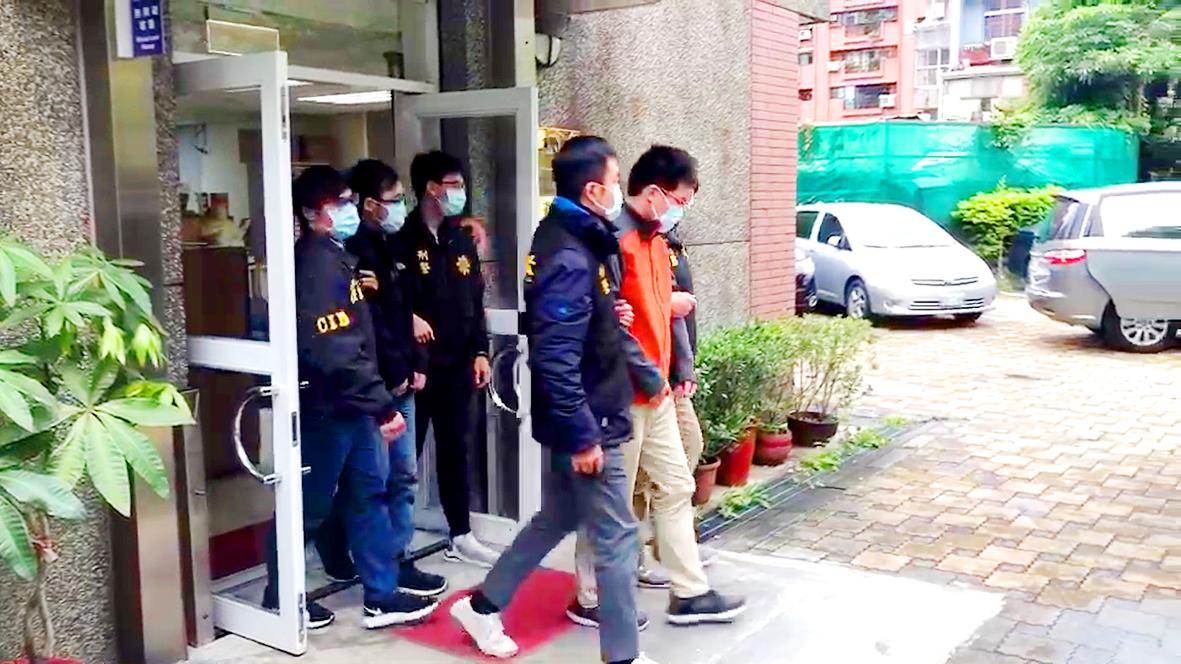The Criminal Investigation Bureau has shut down what was reportedly the nation’s top video piracy Web site, 8maple.ru (楓林網), and arrested its two alleged proprietors in Taoyuan.
Authorities estimated that the site had infringed on NT$1 billion (US$33.2 million) in copyrights owned by the movie and TV industries.
The crackdown was the result of international cooperation with the US’ Motion Picture Association, Japan’s Content Overseas Distribution Association, and local TV networks initiating probes and providing authorities with evidence of illegal downloads, bureau officials said.

Photo copied by Chiu Chun-fu, Taipei Times
The site allowed users to download movies and TV shows from Taiwan, China, Japan, South Korea, Thailand, the US and Europe for free, Telecommunications Investigation Corps section head Chen Juei-chin (陳瑞金) told a media briefing.
“The site was in 2014 started in Taiwan by the two suspects, who have the expertise as they are software engineers,” Chen said. “They made about NT$2 million in monthly revenue from business and service company ads on the site.”
At the start, the two men promoted the site as an online commercial advertising service, but soon turned it into a video piracy site, for which they paid a total of NT$300,000 monthly for 25 servers in five countries — the US, Canada, Ukraine, France and Romania — to avoid investigation and prosecution by Taiwanese authorities, Chen added.
A bureau investigation found that monthly downloads from the site reached about 30 million, while the proprietors made about NT$4 million in advertising revenue.
The site was reportedly Taiwan’s top site for downloading movies and TV shows for free, and was also popular with people in China and other countries, becoming a prominent international piracy site.
The two suspects, surnamed Chen (陳), 33, and Chuang (莊), 32, are friends who were in the same software engineering program and graduated at the top of their class, for which they received scholarships for graduate studies at National Taiwan University, bureau officials said.
Investigators found that the two men had purchased two luxury mansions in Taoyuan, allegedly using their illegal profits from running the site to each pay NT$16 million in cash for the properties.
After weeks of surveillance and collecting evidence, the bureau coordinated with Taoyuan prosecutors and local police to conduct the raid at the end of last month, leading to the arrests of the two suspects, as well as the seizure of their properties and NT$60 million in their bank accounts, bureau officials said.
The officials quoted the two as saying that they started the site because they are both fans of TV dramas and foreign movies, so they decided to put their software expertise to good use in the name of entertainment and profit.

Taiwan has received more than US$70 million in royalties as of the end of last year from developing the F-16V jet as countries worldwide purchase or upgrade to this popular model, government and military officials said on Saturday. Taiwan funded the development of the F-16V jet and ended up the sole investor as other countries withdrew from the program. Now the F-16V is increasingly popular and countries must pay Taiwan a percentage in royalties when they purchase new F-16V aircraft or upgrade older F-16 models. The next five years are expected to be the peak for these royalties, with Taiwan potentially earning

STAY IN YOUR LANE: As the US and Israel attack Iran, the ministry has warned China not to overstep by including Taiwanese citizens in its evacuation orders The Ministry of Foreign Affairs (MOFA) yesterday rebuked a statement by China’s embassy in Israel that it would evacuate Taiwanese holders of Chinese travel documents from Israel amid the latter’s escalating conflict with Iran. Tensions have risen across the Middle East in the wake of US and Israeli airstrikes on Iran beginning Saturday. China subsequently issued an evacuation notice for its citizens. In a news release, the Chinese embassy in Israel said holders of “Taiwan compatriot permits (台胞證)” issued to Taiwanese nationals by Chinese authorities for travel to China — could register for evacuation to Egypt. In Taipei, the ministry yesterday said Taiwan

‘LIKE-MINDED PARTNER’: Tako van Popta said it would be inappropriate to delay signing the deal with Taiwan because of China, adding he would promote the issue Canadian senators have stressed Taiwan’s importance for international trade and expressed enthusiasm for ensuring the Taiwan-Canada trade cooperation framework agreement is implemented this year. Representative to Canada Harry Tseng (曾厚仁) in an interview with the Central News Agency (CNA) said he was increasingly uneasy about Ottawa’s delays in signing the agreement, especially as Ottawa has warmed toward Beijing. There are “no negotiations left. Not only [is it] initialed, we have three versions of the text ready: English, French and Mandarin,” Tseng said. “That tells you how close we are to the final signature.” Tseng said that he hoped Canadian Prime Minister Mark Carney

Taiwan is awaiting official notification from the US regarding the status of the Agreement on Reciprocal Trade (ART) after the US Supreme Court ruled US President Donald Trump's global tariffs unconstitutional. Speaking to reporters before a legislative hearing today, Premier Cho Jung-tai (卓榮泰) said that Taiwan's negotiation team remains focused on ensuring that the bilateral trade deal remains intact despite the legal challenge to Trump's tariff policy. "The US has pledged to notify its trade partners once the subsequent administrative and legal processes are finalized, and that certainly includes Taiwan," Cho said when asked about opposition parties’ doubts that the ART was